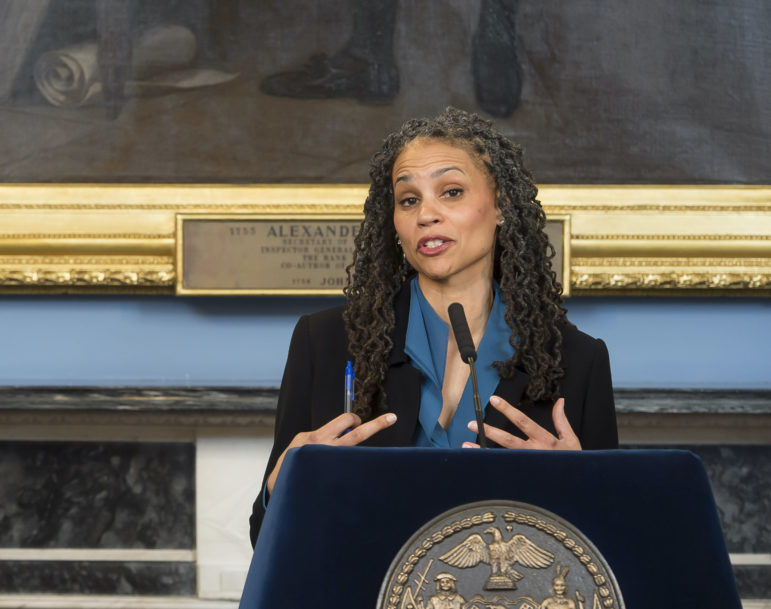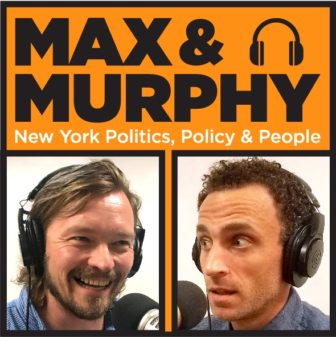The mayoral hopeful, whose background is as a civil-rights lawyer, is pushing brick-and-mortar policy as she navigates a crowded field.

Rob Bennett for the Office of Mayor Bill de Blasio
Maya Wiley in 2014, being introduced as Mayor de Blasio’s counsel. She left the administration in 2016.The Lance Corporal Thomas P. Noonan Jr. Playground on Greenpoint Avenue in Sunnyside is an acre of public space, a memorial to a Vietnam War hero, and home to a handball court. It is also a little economic engine.
The Department of Parks and Recreation is scheduled to spend more than $200,000 on a construction project there this fiscal year, and another $2 million in 2023.
The people who come to do that work will spend their wages at least partly in the neighborhood, buying egg sandwiches at nearby bodegas and maybe an after-work beer or two at the closest bar. The bar owner will purchase more beer from her distributor, and the bodega owner will get that new coffee machine he’d been eyeing. Everyone will go home to pay their rent, buy groceries and get new bikes for their 10-year-olds. And voila, through the multiplier effect, that capital construction spending will have stimulated a little ripple of broader economic activity.
The Noonan Playground project is among $70 billion of capital construction work the city has budgeted over the next four years. Democratic mayoral candidate Maya Wiley believes that pool of money can be used to give New York City—and especially the neighborhoods hardest hit by COVID-19—the economic boost that federal aid alone is unlikely to deliver.
“We have a capital construction budget in the city, that is money. That is stimulative. And we should think about it as stimulative because it does—those projects are creating jobs. And we should think about that type of stimulation as well as the fact that we will probably have an infrastructure bill out of the federal government,” Wiley told the Max & Murphy Show on Wednesday. “That’s also capital money. Those are stimulative things, but we need to identify the projects that solve multiple problems, including creating jobs that our people who need them the most can connect with and make sure they are jobs with dignity, make sure they are jobs with justice.”
“And so that’s the kind of thing the city government absolutely has the opportunity and ability to do right now, because that is within the control of the government. And it’s recognizing that we have assets and resources,” Wiley added.
Wiley, a veteran civil-rights lawyer, faces the same task as her rivals in the growing mayoral field: answering a yearning for social justice while also demonstrating nuts-and-bolts management chops to navigate New York out of the COVID-19 crisis.
In the capital budget, Wiley describes a way to check all the boxes: COVID response, management know-how and, as she indicated, addressing disparities. “The reality is looking at both the promises that have been made in communities like Southeast Queens or Northwest Bronx, or, you know, that may be those right kinds of projects to make sure they actually get pushed and off the ground. And there also may be some new opportunities,” she says.
When times are tough, the capital budget offers more potential than the operating budget for stimulus spending because it is not directly tied to tax revenue: Capital money is borrowed through bonding. There are still limits to what the city can borrow and spend, but when stimulus is the goal, timing is what matters. The city could theoretically front-load its planned spending to get more impact from the same total amount of capital outlay. Or, the city could merely execute all its planned spending. Within the capital budget the city makes allowance for $4.5 billion of fiscal 2021 spending to not actually occur through what’s called a “reserve for unattained commitments.”
How much that reserve could be reduced by more efficient planning and procurement is unclear; sometimes capital spending is constrained by the supply of private-sector expertise or the need to sequence multiple projects.
Wiley also discussed how she would handle the desegregation of city schools, and whether her approach to that issue has changed in light of the pandemic’s impact on education.
Hear the conversation below, or the full show, which includes an interview of Bronx State Sen. Jamaal Bailey.
Maya Wiley, Democrat for Mayor
Max & Murphy Full Show of December 16, 2020
With reporting by Ben Max & Inés Yildiz









